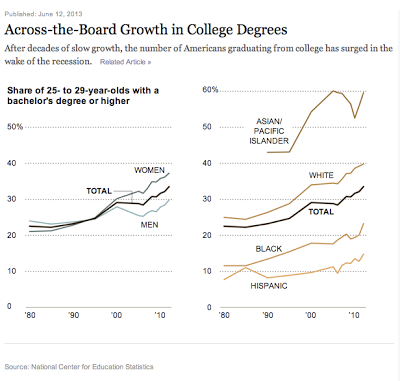On a similar (but really unrelated) story, over the past three decades the US has experienced a steady increase of College graduands. New York Times has the story:
 |
| Source: New York Times |
"The increases appear to be driven both by a sharp rise in college enrollment and by an improvement among colleges in graduating students. The trends could bring good news in future years, economists say, as more Americans become qualified for higher-paying jobs as the economy recovers.
College attendance has increased in the past decade partly because of the new types of jobs that have been created in the digital age, which have increased the wage gap between degree holders and everyone else. The recent recession, which pushed more workers of all ages to take shelter on college campuses while the job market was poor, has also played a role."
I made this point several times before, most precisely in an article from January last year, entitled "Percentages and inequality: Where is the middle class?". The increase of the trend (most strongly) started in the beginning of the 1980s, right about the same time when the level of US inequality also started to rise sharply. And the linkage to the new types of jobs in the digital age, and even before that in the services industry, is also correct. This has put significant pressure on rising inequality between those who gained a college degree and could now obtain higher paid jobs in new, booming industries, and those who haven't and who remained on lower salaries. In addition, the low- and middle-income workers have began transferring their earnings from cash to non-cash benefits such as health insurance and pensions, which don't tend to show up as taxable income (thereby resulting in a lower income than it really is for the low-and middle-income workers).
This surely isn't enough to explain the rising inequality in the US, but it certainly is one part of the picture. Moreover, who is to say such a turn of events (more college graduates, new types of jobs) was bad for the economy? Especially for the >10% more people who gained their college degrees in the past few decades (in total 33.5% of Americans hold a College degree). Finally, this piece of information is also crucial:
"The unemployment rate for graduates of four-year colleges between the ages of 25 and 34 was 3.3 percent in March, according to the Bureau of Labor Statistics. For high school graduates in the same age group who had not attended college, it was 11.8 percent.
Today’s premium for college degrees is caused partly by increasing selectiveness among employers about whom they hire and screening based on education even for positions that do not require higher skills. But jobs themselves have changed, too.
“Think about jobs 15 years ago that didn’t need any college education ... Many of them now do ... “Maybe you don’t need a bachelor’s to change bedpans ... but today if you’re an auto mechanic, you really have to understand computers and other technical things.”
This all bounds down well to the fact that the technological shock of the ongoing Third Industrial Revolution has changed the rules of the game on the labour market. As it always does. Many have adapted to it, and hence the rise of college degrees. Having in mind the upcoming disruptive technological shocks, I expect to see an even steadier rise in college enrollment as new types of skills become necessary. How this will impact inequality, I'm not quite sure, but I do expect a lot of resistance towards this change, even as more and more people start obtaining higher skills.